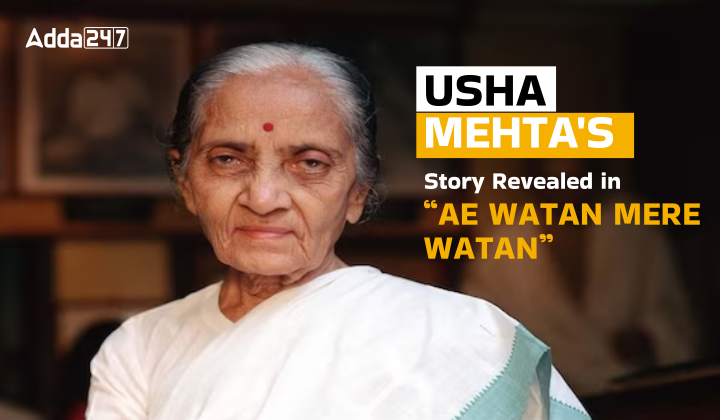Table of Contents
The recently released film “Ae Watan Mere Watan” (My Country, My Homeland) sheds light on the remarkable life of Usha Mehta, a true champion of India’s freedom struggle.
A Gandhian at Heart
Born in 1920 in the village of Saras, Gujarat, Usha Mehta embodied the ideals of Mahatma Gandhi. Affectionately known as Ushaben, her commitment to freedom began at a young age. In 1928, at the tender age of eight, she fearlessly participated in a protest march against the Simon Commission, a turning point in her journey.
A Voice in the Dark- The Secret Congress Radio
Usha Mehta’s defiance against British rule reached new heights in 1942. During the pivotal Quit India Movement, she, along with her courageous associates, played a critical role in establishing the clandestine Congress Radio. This covert radio station, operational by August 27th, became a beacon of hope in a time of darkness.
The Quit India Movement, also known as the August Movement or Bharat Chodo Andolan, was a significant civil disobedience movement launched by Mahatma Gandhi and the Indian National Congress on August 8, 1942, in Bombay (now Mumbai) at Gowalia Tank Maidan, also known as August Kranti Maidan.
Here’s a breakdown of the key points:
- Date: August 8, 1942
- Leaders: Mahatma Gandhi and the Indian National Congress
- Goal: To demand an end to British rule in India
- Methods: Civil disobedience protests, non-violent resistance
- Significance: A major turning point in the Indian independence movement, pushing for immediate withdrawal of British power.
The Quit India Movement was a pivotal moment in India’s struggle for independence. It marked a shift towards a more assertive approach, demanding immediate British withdrawal rather than gradual self-governance. The movement faced harsh suppression by the British Raj, but it ignited a spirit of resistance that continued to grow in the years that followed.
Defying the Odds- Setting Up an Underground Station
The establishment of Congress Radio was an act of immense daring. Following the outbreak of World War II in 1939, the British had revoked all amateur radio licenses, making possession of such equipment illegal. Undeterred by the risks involved, Usha Mehta, alongside Babubhai Khakar, Vithalbhai Jhaveri, and Chandrakant Jhaveri, braved the challenge.
The Congress Radio Case and Legacy
Their clandestine operation could not remain hidden forever. The five individuals involved in Congress Radio faced trial. While Vithalbhai Jhaveri and Nanak Gainchand Motwane (who had supplied crucial equipment) were acquitted, Usha Mehta, Babubhai Khakar, and Chandrakant Jhaveri received harsh sentences. Usha, however, was released from Yerawada Jail in Pune in March 1946, hailed as “Radio-ben” by the nationalist media.
A Story of Courage and Innovation
Usha Mehta’s story is an inspiring testament to the unwavering spirit of India’s freedom fighters. Her courage, innovation, and dedication to the cause of freedom serve as a powerful reminder of the sacrifices made to achieve independence. “Ae Watan Mere Watan” offers a compelling opportunity to learn more about this extraordinary woman and the lasting impact she made on India’s history.



 TSPSC Group 1 Question Paper 2024, Downl...
TSPSC Group 1 Question Paper 2024, Downl...
 TSPSC Group 1 Answer key 2024 Out, Downl...
TSPSC Group 1 Answer key 2024 Out, Downl...
 UPSC Prelims 2024 Question Paper, Downlo...
UPSC Prelims 2024 Question Paper, Downlo...





